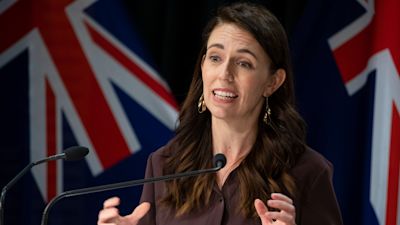Are workers getting more and more burnt out?

Words by Multimedia Producer Rachel Dixon
"I no longer have enough in the tank,” was how Prime Minister Jacinda Ardern explained the shock news that she was bringing her six-year tenure to an end.
In a speech on Thursday she announced she would be leaving the top job and was looking forward to spending time with her family, joking she and he partner Clarke Gayford would finally get the opportunity to get married.
While not everyone’s day job is running a country of five million people, many can relate to Ms Arden’s comments of not having "enough in the tank".
In the UK, 46% workers feel "more prone to extreme levels of stress" compared with a year ago (March 2020), according to a YouGov Survey.
From 2019, burnout was recognised by the World Health Organisation (WHO) as an "occupational phenomenon".
The term means when you’re "forcing yourself to work until you mentally and physically can’t do your job," says expert Dr Dean Burnett.
The 41-year-old neuroscientist and author of new book Emotional Ignorance, has noticed more people are talking about burnout and believes the numbers experiencing it have increased.
He said: “There’s a lot more pressure on people. There’s more reasons to be burnt out due to lockdown and the pandemic.
“We’re seeing more people on the front line - teachers, supermarket workers and nurses getting burnt out due to the pandemic.”
Studies back this up. A survey (done in the US) revealed that pre-pandemic, 43 percent of workers reported experiencing some form of burnout. When conducted again post-2020, the survey revealed that 52 percent of employees reported burnout.
Burnout seems to affect young people, specifically women the most.
A new term, 'quiet quitting' underpins the workplace pressures placed on people in today’s society.
Collins dictionary defines it as "the practice of doing no more work than one is contractually obliged to do, esp in order to spend more time on personal activities".
Dr Burnett says: “I don’t agree with the phrase quiet quitting, the fact that it suggests you’re wrong for doing the job you’re paid for is seen as doing the bare minimum.
“You should be doing what you’re paid for, forcing yourself to do more contributes to burn out.
“It’s a catchy phrase which will catch on. It’s really revealing and disconcerting about the times we live in.”
As the prevalence of burnout gets worse - and Jacinda Ardern calls it quits - Dr Burnett highlights the important of speaking out.
Jacinda Ardern resigns as New Zealand Prime Minister
He said: “I think it’s great that someone so high profile is acknowledging it. It’s really important to say if you can’t manage, because things could go wrong and you could easily make mistakes.”
Sophie Corlett, Director of External Relations at Mind said: “When high-profile people speak out about their wellbeing, it can encourage other people to do the same, especially in the workplace, where we know many people still face stigma and discrimination relating to their mental health.
"Politicians are not immune to these feelings, often working in a uniquely pressurised environment."
But not everyone struggling with burnout has the financial stability to take a career break, leaving many in an even worse situation.
Dr Burnett said: “For people in low-income families you’re forced to chose between wellbeing and survival and the latter will always come first.
“Parents are working two jobs to support their families but it’s damaging their mental health and wellbeing.”
Nine causes of burnout
Money worries
Working from home
Worries about job security
Isolation
Physical health
Sleep
Relationships
Home-schooling children
Caring for others
How to cope with burnout
Dr Burnett advises that, as burnout is heavily linked with stress, it’s important to find a support network.
He also says exercising, mindfulness or trying a new hobby can make a difference.
He says, anything that reduces that stress, as long as it’s not harmful itself, can help prevent burnout.
Sophie Cordett adds: “Remember, it's always ok to ask for help if you’re experiencing stress. It is important to talk about your feelings and open up when you are struggling.
"Try talking to a trusted friend, family member or colleague.
"Speak to your GP if you’re feeling down or struggling to sleep for more than two weeks, as you may be experiencing symptoms of a common mental health problem such as depression or anxiety.”
It was one of the biggest news stories of our time - and it's still not over. So what did Boris Johnson know about Downing Street’s notorious parties? With fresh revelations from our Number 10 sources, in their own words, listen to the inside story...